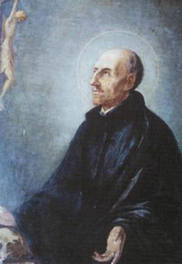
His wife, Eleanora of Castille, died and he entered the Society of Jesus, that therein he might hide himself more safely, and bar by the obligation of a vow the path to dignities. He was the worthy leader of many princes who have embraced a life of hardship, and Charles V himself when he resigned the Empire did not deny that he had been moved and shewn the way by Francis. In his struggle after austerity Francis, by fasting, by iron chains, by the roughest of haircloth, by long and bloody flagellations, and by denying himself any but very little sleep, reduced his body to the last degree, but would still spare no toil to overcome himself and to save souls. Thus full of ghostly strength, he was appointed by holy Ignatius Commissary-General of the Society in Spain, Portugal, and the Indies, and notwithstanding all the precautions he could take to prevent it, he was chosen by the general Congregation of the Society to be General, being the third who held that office. In this position his wisdom and holiness of life greatly endeared him to Princes and Popes, and besides founding or enlarging very many houses in divers places, he sent brethren into the kingdom of Poland, into the islands of the Ocean, and into the provinces of Mexico and Peru, and into other lands also Apostolic men who spread the Roman Catholic faith by their preaching, their sweat, and their blood.
He thought so little of himself that he gave himself the nickname of Francis the sinner. By the Popes he was oftentimes offered the dignity of Cardinal of the Roman Church, but the lowly firmness with which he refused it could never be overcome. In his cheap esteem of the world and of himself his chief pleasures were to clean the house, to beg for food from door to door, and to wait upon the sick in hospitals. He spent many hours every day, oftentimes eight and sometimes ten, in prayer and meditation. An hundred times every day he worshipped God upon his knees. He never missed the opportunity of offering the Holy Liturgy, and the fire from God which burnt within him sometimes shone forth in his countenance when he was lifting the Sacred Host, or preaching. By an inward power given him from God he could tell where the most Holy Body of Christ, under the Eucharistic veils, was kept. The blessed Pius V sent Francis with the Cardinal Alessandrino on an embassy to unite the Christian princes against Turkey. His vital strength was then nearly worn out, but, through obedience, he undertook the toil of the journey. He became much worse during the travelling, and on his return brought to a blessed end at Rome, as had been his desire, the pilgrimage of this life, in the sixty-second year of his own life, and that of salvation 1572. Holy Teresa, who used his advice, called him an holy man, and Gregory XIII, a faithful servant. He was famous for many and great signs and wonders, and Clement X at last numbered him among the Saints.




